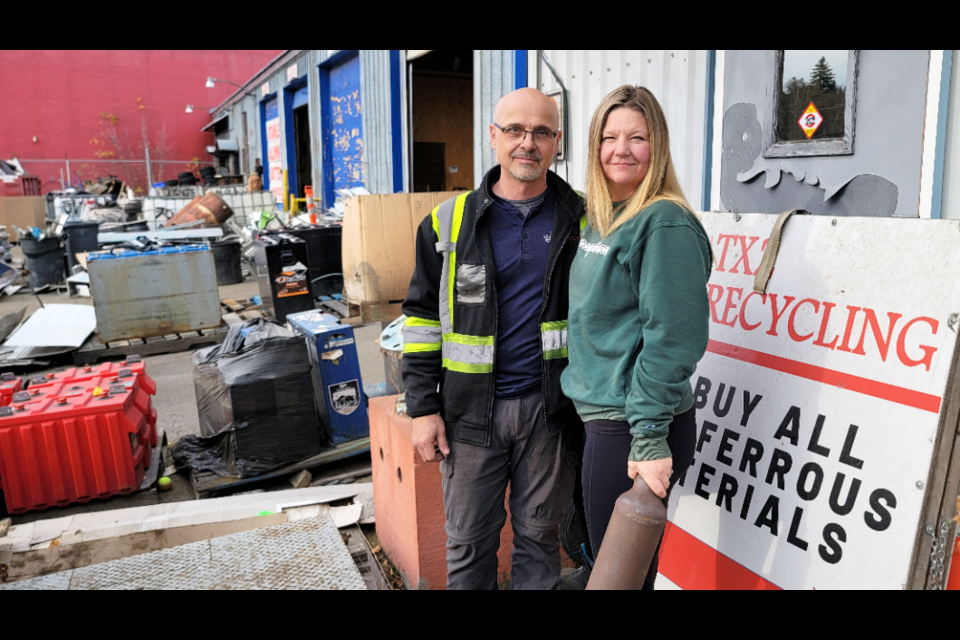When Tony Muratori opened TX2 Recycling four years ago in the light industrial area east of downtown Prince George, the homeless encampment that borders his scrap metal yard did not exist.
After a year of operating his business on Fourth Avenue, the first residents of Moccasin Flats came with their tents, tarps and firepits and did not leave.
In fact, some became his regular customers. They sort through dumpsters and industrial yards and help themselves to pieces of wire, metal sheeting or scrap pieces of pipe they load into their carts to bring to Muratori.
Sometimes a full cart will net the seller $18, sometimes it’s only six bucks. Licensed to buy non-ferrous metals, catalytic converters and batteries, TX2 attracts a daily crowd of walk-in customers from the downtown core and Muratori is fighting the perception that his business is a magnet for stolen metal. In actuality, what that element brings into his yard each day represents only a tiny percentage of his business revenue.
“When I moved in here I had no idea what I was getting myself into, I didn’t know that (homeless camp) was going to come up a year later,” said Muratori.
“If I would have said to my wife before she took a leave of absence (from her job at BC Hydro), ‘Tanya, every day you’re going to have to deal with a homeless person, every day you’re going to have to deal with drug dealers or people wanting to use our bathroom. You’re going to have to sort through the people who are thieves and junkies and keep them out of here.’ She was working in a comfortable 8-to-5 job and she would have said, ‘Hell no, “I’m not working here.’”
Muratori has been in business long enough to know when items his walk-in customers try to sell have obviously been stolen, like the guy who dragged in 80 pounds of welding cable or an assortment of park bench brass plates with the inscription scratched off.
He’s required to follow the regulations of the Metal Dealers and Recyclers Act. If he doesn’t, he risks getting fined or losing his license.
The law requires all buyers of scrap metal to demand valid identification of sellers and register what they sell and where they obtained it. Cash sales are limited to a maximum $50 and sellers are required to input their registration number into an automated teller machine which snaps a photo of each customer as they retrieve their cash.
Two years ago, catalytic converters were added to the restricted list of items covered by the Metal Dealers and Recyclers Act and buyers like Muratori could no longer pay cash to legitimate sellers who brought them in from autowrecking yards. He said the new provincial law essentially opened a black market to unscrupulous sellers who take cash for their converters to avoid a paper trail. He regularly gets visits from people driving white vans from Alberta asking if he has any for sale.
“People don’t want to pay taxes on stuff, they want cash under the table, and they don’t want people to know how many they sold or what they sold,” Muratori said. “Because they’re from out of province, they’re paying cash. It just pushed it underground, so now I don’t know who’s selling what anymore. These white-vanners come in and pay cash. Alberta has a reporting system but there’s no cross-border regulation.”
Muratori says the same rules that prevent recyclers from selling catalytic converters for cash should also apply to autowreckers, who he says should also be required to register those sales.
TX2 is a thriving business and Tanya Muratori likes the work but has no time for people who attack her and her husband on social media, accusing them of perpetuating criminal activity for buying metal from cart pushers.She said the focus should be on bigger-picture issues that plague the city - drug addictions, poverty, mental health, lack of affordable housing.
“It’s sad that people think we should be shut down,” she said. “I don’t think it’s just a metal-recycling problem. It’s a homeless problem, it’s a drug problem, a mental illness problem, it’s bad. We’re doing everything we can as business owners to do things legitimately, according to the Metal Dealers Act, but are we going to turn people away because they’re homeless? They’re still people.”



